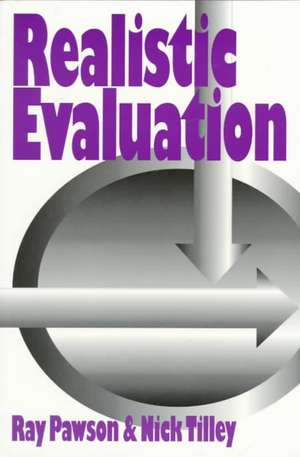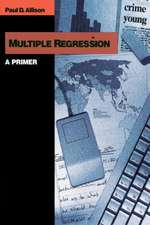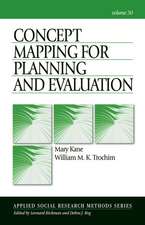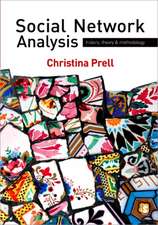Realistic Evaluation
Autor Ray Pawson, Nick Tilleyen Limba Engleză Paperback – 22 apr 1997
The book offers a complete blueprint for evaluation activities, running from design to data collection and analysis to the cumulation of findings across programmes and onto the realization of research into policy. The argument is developed using practical examples throughout and is grounded in the major fields of programme evaluation.
This book will be essential reading for all those involved in the evaluation process especially those researchers, students and practitioners in the core disciplines of sociology, social policy, criminology, health and education.
`This book is a must for those engaged in the field, providing a fully illustrated text on evaluation with numerous examples from the criminal justice system. Unusually, it offers something for the academic, practitioner and student alike. I found Pawson and Tilley's latest work on evaluation an enjoyable and informative read. For myself their "realistic evaluation" clarified and formalised a jumbled set of ideas I had already been developing. Although not everyone will agree with the methodology proposed by the authors, this book is a valuable read as it will cause most of us at least to review our methodological stance' - International Journal of Police Science and Management
`This is an engaging book with a strong sense of voice and communicative task. The voice is sometimes strident, but always clear. Its communicative qualities are evident equally in its structure: lots of signposting for the reader within and across chapters' - Language Teaching Research
`This provocative, elegant and highly insightful book focuses on the effective incorporation of actual practice into the formulation of evaluation methodology. What a pleasure to read sentences like: "The research act involves "learning" a stakeholder's theories, formalizing them, and "teaching" them back to that informant who is then in a position to comment upon, clarify and further refine the key ideas". Pawson and Tilley have given us a wise, witty and persuasive account of how real practitioner experience might be encouraged to intrude on (and modify) researchers' concepts about program processes and outcomes. This holds important promise for achieving something that is devoutly to be wished: closer interaction among at least some researchers and some policy makers' - Eleanor Chelimsky, Past-President of the American Evaluation Association
`This is a sustained methodological argument by two wordly-wise social scientists. Unashamedly intellectual, theoretically ambitious yet with a clear but bounded conception of evaluation. It is articulate, occasionally eloquent and always iconoclastic, whilst eschewing "paradigm wars". The Pawson and Tilley "realist" call to arms threatens to take no prisoners among experimentalists, constructivists or pluralists. It is the kind of book that clarifies your thoughts, even when you disagree with everything they say' - Elliot Stern, The Tavistock Institute
| Toate formatele și edițiile | Preț | Express |
|---|---|---|
| Paperback (1) | 452.24 lei 3-5 săpt. | +22.38 lei 5-11 zile |
| SAGE Publications – 22 apr 1997 | 452.24 lei 3-5 săpt. | +22.38 lei 5-11 zile |
| Hardback (1) | 1285.54 lei 6-8 săpt. | |
| SAGE Publications – 28 apr 1997 | 1285.54 lei 6-8 săpt. |
Preț: 452.24 lei
Nou
Puncte Express: 678
Preț estimativ în valută:
86.56€ • 94.06$ • 72.76£
86.56€ • 94.06$ • 72.76£
Carte disponibilă
Livrare economică 31 martie-14 aprilie
Livrare express 15-21 martie pentru 32.37 lei
Preluare comenzi: 021 569.72.76
Specificații
ISBN-13: 9780761950097
ISBN-10: 0761950095
Pagini: 256
Ilustrații: tables, figures, indexes, bibliography
Dimensiuni: 156 x 234 x 14 mm
Greutate: 0.39 kg
Ediția:1
Editura: SAGE Publications
Colecția Sage Publications Ltd
Locul publicării:London, United Kingdom
ISBN-10: 0761950095
Pagini: 256
Ilustrații: tables, figures, indexes, bibliography
Dimensiuni: 156 x 234 x 14 mm
Greutate: 0.39 kg
Ediția:1
Editura: SAGE Publications
Colecția Sage Publications Ltd
Locul publicării:London, United Kingdom
Recenzii
`This book is a must for those engaged in the field, providing a fully illustrated text on evaluation with numerous examples from the criminal justice system. Unusually, it offers something for the academic, practitioner and student alike. I found Pawson and Tilley's latest work on evaluation an enjoyable and informative read. For myself their `realistic evaluation' clarified and formalised a jumbled set of ideas I had already been developing. Although not everyone will agree with the methodology proposed by the authors, this book is a valuable read as it will cause most of us at least to review our methodological stance' - International Journal of Police Science and Management
`This is an engaging book with a strong sense of voice and communicative task. The voice is sometimes strident, but always clear. Its communicative qualities are evident equally in its structure: lots of signposting for the reader within and across chapters' - Language Teaching Research
`This provocative, elegant and highly insightful book focuses on the effective incorporation of actual practice into the formulation of evaluation methodology. What a pleasure to read sentences like: "The research act involves "learning" a stakeholder's theories, formalizing them, and "teaching" them back to that informant who is then in a position to comment upon, clarify and further refine the key ideas". Pawson and Tilley have given us a wise, witty and persuasive account of how real practitioner experience might be encouraged to intrude on (and modify) researchers' concepts about program processes and outcomes. This holds important promise for achieving something that is devoutly to be wished: closer interaction among at least some researchers and some policy makers' - Eleanor Chelimsky, Past-President of the American Evaluation Association
`This is a sustained methodological argument by two wordly-wise social scientists. Unashamedly intellectual, theoretically ambitious yet with a clear but bounded conception of evaluation. It is articulate, occasionally eloquent and always iconoclastic, whilst eschewing "paradigm wars". The Pawson and Tilley "realist" call to arms threatens to take no prisoners among experimentalists, constructivists or pluralists. It is the kind of book that clarifies your thoughts, even when you disagree with everything they say' - Elliot Stern, The Tavistock Institute
`This is an engaging book with a strong sense of voice and communicative task. The voice is sometimes strident, but always clear. Its communicative qualities are evident equally in its structure: lots of signposting for the reader within and across chapters' - Language Teaching Research
`This provocative, elegant and highly insightful book focuses on the effective incorporation of actual practice into the formulation of evaluation methodology. What a pleasure to read sentences like: "The research act involves "learning" a stakeholder's theories, formalizing them, and "teaching" them back to that informant who is then in a position to comment upon, clarify and further refine the key ideas". Pawson and Tilley have given us a wise, witty and persuasive account of how real practitioner experience might be encouraged to intrude on (and modify) researchers' concepts about program processes and outcomes. This holds important promise for achieving something that is devoutly to be wished: closer interaction among at least some researchers and some policy makers' - Eleanor Chelimsky, Past-President of the American Evaluation Association
`This is a sustained methodological argument by two wordly-wise social scientists. Unashamedly intellectual, theoretically ambitious yet with a clear but bounded conception of evaluation. It is articulate, occasionally eloquent and always iconoclastic, whilst eschewing "paradigm wars". The Pawson and Tilley "realist" call to arms threatens to take no prisoners among experimentalists, constructivists or pluralists. It is the kind of book that clarifies your thoughts, even when you disagree with everything they say' - Elliot Stern, The Tavistock Institute
Cuprins
A History of Evaluation
Out with the Old
Weaknesses in Experimental Evaluation
In with the New
Introducing Scientific Realism
How To Design a Realistic Evaluation
How To Make Evaluations Cumulate
How To Construct Realistic Data
Utilizing Stakeholders' Knowledge
No Smoking without Firing Mechanisms
A `Realistic' Consultation
Evaluation, Policy and Practice
Realizing the Potential
The New Rules of Realistic Evaluation
Out with the Old
Weaknesses in Experimental Evaluation
In with the New
Introducing Scientific Realism
How To Design a Realistic Evaluation
How To Make Evaluations Cumulate
How To Construct Realistic Data
Utilizing Stakeholders' Knowledge
No Smoking without Firing Mechanisms
A `Realistic' Consultation
Evaluation, Policy and Practice
Realizing the Potential
The New Rules of Realistic Evaluation
Notă biografică
Given my job title, it will come as no surprise that my main interest lies in research methodology. This does not quite bracket me with the technical nerds, however, for I have written widely on the philosophy and practice of research, covering methods qualitative and quantitative, pure and applied, contemporaneous and historical. There is a common ¿realist¿ thread underlying every word, albeit a modest, middle-range, empirically-rich kind of realism.
Descriere
Realistic Evaluation shows how programme evaluation needs to be, and can be, bettered. It presents a profound yet highly readable critique of current evaluation practice, and introduces a `manifesto' and `handbook' for a fresh approach.









